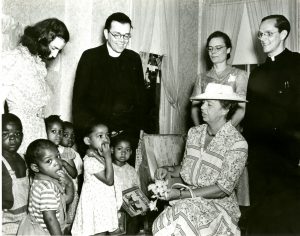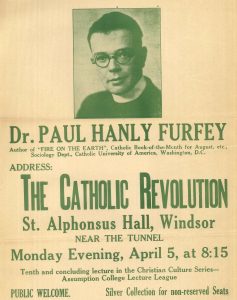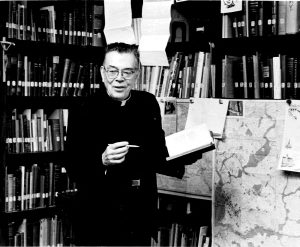
On a spring day in 1941, First Lady Eleanor Roosevelt visited the campus of The Catholic University of America (CUA) and the nearby university sponsored Fides House, which promoted interracial social justice. The First Lady recounting in her syndicated newspaper column, ‘My Day,’ “A group from Catholic University has taken a small house, where they are running a nursery school, a boys club, and a sewing class for adolescent girls. The expense is borne by some of those working in the sociology courses, who deny themselves in order to carry on this work. It is, perhaps, the most valuable kind of education, because there is nothing as valuable as actual contact with problems and an effort to work them out in a practical way.”¹ The person responsible for attracting the First Lady’s attention to Fides House was ‘Supernatural Sociologist,’² Rev. Paul Hanly Furfey (1896-1992), described as “liberal, radical, and revolutionary”³ by Nicholas Rademacher in his new biography based on the Furfey Personal Papers at Catholic University.

In a career spanning most of the twentieth century, Furfey sought transformative social reform via a unique combination of Catholic faith, scientific method, and radical ethics. Both an active thinker and dedicated activist, he was not afraid to stand out despite leaving ruffled feathers in his wake, including sparring in print with fellow priests Raymond A. McGowan and John Courtney Murray. Furfey, a native of Cambridge, Massachusetts, graduated from Boston College in 1917, was a Knights of Columbus Fellow at CUA in Washington, D.C., 1917-1918, and earned a masters’ degree at St. Mary’s Seminary in Baltimore, Maryland, in 1918. After further Theological studies at St. Mary’s and the Sulpician Seminary in Washington, 1918-1922, he earned a doctorate in Sociology from CUA in 1926. Ordained in 1922, he joined the CUA faculty in 1925 and headed the Sociology Department from 1934 to 1963. He also served as Co-Director, along with Thomas J. Harte, of the Department’s Bureau of Social Research (BSR) and of CUA’s Center for Research in Child Development.
In 1936, Furfey was one of the founders, along with Gladys Sellew, of Il Poverello House, a settlement house for the poor and homeless on Tenth Street, Northwest, in Washington, D.C. A few years later, he co-founded another house, Fides House, on New Jersey Avenue, NW, along with Mary Elizabeth Walsh, a former student, fellow Sociology professor, and lifelong friend. Fides House was a project in Catholic social activism and study of a deteriorated D.C. neighborhood. The house garnered archdiocesan support with Walsh as director and Furfey as chaplain and member of the board of directors. Fighting racism, which he called ‘America’s Shame,’⁴ was always a central mission for him. Much later, in 1968, he founded Emmaus House in Brookland, near CUA, as a center for nonviolent protest against discrimination and the Vietnam War. Furfey was especially opposed to ROTC on the CUA campus, but there were limits to his activism as he was apparently unaware and would not have approved of an absurd 1970-1971 plot involving Emmaus House⁵ to kidnap Secretary of State Henry Kissinger!

Furfey was also involved with other local organizations and institutions, serving as Assistant Director of Catholic Charities of Washington as well as teaching at Trinity College. He also was one of two part-time Assistant Directors of the Juvenile Delinquency Evaluation Project (JDEP) tasked to make a full-scale fact finding survey of how public and private agencies could combat juvenile delinquency in New York City. At the national level, he was President of the American Catholic Sociological Society, now the Association for the Sociology of Religion. He retired in 1966, becoming Professor Emeritus and remaining at CUA as a Lecturer until 1972. He published numerous articles and books including Fire on the Earth (1936), History of Social Thought (1942), The Scope and Method of Sociology (1953), The Respectable Murderers (1966), and Love and the Urban Ghetto (1974). He received the papal medal Pro Ecclesia et Pontifice in 1958 and died on June 8, 1992 at Providence Hospital in Washington, D.C. His legacy was honored by a group of international scholars at Catholic University in 2003 for a symposium The Intellectual and Moral Heritage of the Rev. Paul Hanly Furfey.
¹ (https://www2.gwu.edu/~erpapers/myday/displaydoc.cfm?_y=1941&_f=md055900).
² By ‘Supernatual Sociologist’ I do not mean to infer Furfey was a priest by day and a vampire hunter by night, but rather he promoted change and reform via a fusion of Christian faith, social action, and scientific method. In particular, see works of Luigi Sturzo for more on a ‘Sociology of the Supernatural.’
³ Nicholas K. Rademacher. Paul Hanly Furfey: Priest, Scientist, Social Reformer. New York: Fordham University Press, 2017
⁴ Ibid., p. 110.
⁵ Ibid., p. 233.

Paul Hanly Furfey graduated from Boston College in the class of 1917. His was the first class to spend all four of their college years on the then-new (and current) campus in Chestnut Hill, rather than the original location in the heart of Boston. His biography in the yearbook included the following fond assessments of his character: “In scholastic circles he has ever been at the front. Where a medal was concerned, there was no competition…. Paul is very well acquainted with several different languages, including Mathematics…. Whatever Paul may do in life, we all are sure that he will be an extremely handy man to have around.”